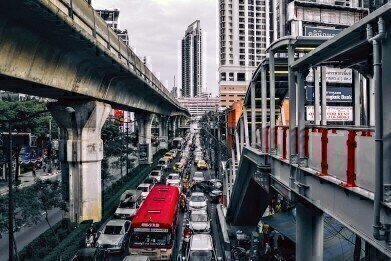Air Clean Up
Bangkok Activists Protest Air Pollution
Feb 17 2020
Bangkok was the scene of a rare public protest last month, as dozens of concerned citizens gathered to vent their anger over the air quality crisis in the Thai capital. Bangkok is the most visited city on the planet and home to over eight million people, but it has been caught in the throes of an air pollution emergency for the last several weeks.
In response, the Thai government has closed schools across the city, but has been otherwise unforthcoming on measures it plans to implement in order to improve the situation. Indeed, the Prime Minister even suggested the onus lay with individual citizens to ensure they remain protected, prompting a backlash among environmentalists and precipitating the public demonstration on Thursday 23rd January.
A dire situation
The primary pollutant measured by the Air Quality Index (AQI) is particulate matter 2.5 (PM2.5), which has been linked to a whole host of medical difficulties. The rapid spread of urban air quality monitors means that we now have more detailed information about PM2.5 concentrations than ever before, but the data does not paint a positive picture.
According to the AQI, air quality that has a rating between 101 and 150 is deemed “unhealthy for sensitive persons”, while that above 150 is rated as “unhealthy for all”. In a damning picture of the city’s airways, 20 days in the month of January fell in the former category, while four reached the worrying levels of the latter, with a high of 180 recorded on the 11th of the month.
Just five days were classified as “moderate”, while there was not a single occasion in the entirety of January when Bangkok’s air qualified as “good”. Indeed, one would have to go all the way back to the 3rd of December to obtain such a reading. The Thai government did close down schools in pollution-affected areas and encouraged those susceptible to respiratory complications to stay at home, but critics say they have not done nearly enough to tackle the problem.
Insufficient action
In recent years, a growing market for continuous emissions monitoring systems (CEMS) has sprung up in developing countries such as Thailand, meaning the general populace are now more aware than ever of the problems facing their lungs. However, the government has not moved with the times and comments made earlier in January by Prime Minister Prayuth Chan-ocha inflamed ordinary Thais when he suggested it was their responsibility to look after themselves.
He said that those in a healthy and fit condition (such as himself) were more than equipped to deal with the adverse conditions, while those more vulnerable to sustaining or exacerbating respiratory conditions (such as the very young and very old, pregnant ladies and those with pre-existing complaints) should arm themselves with the facts and wear face-masks to filter out the pollution.
“Pushing the burden on the people like this is not something an efficient government would do,” commented Chonlatorn Wongrussamee, one of the individuals involved in the January 23rd protest. Instead, the government is being petitioned to implement concrete measures aimed at cleaning up the city’s air.
Events
May 05 2024 Seville, Spain
May 13 2024 Munich, Germany
May 23 2024 Beijing, China
May 23 2024 Beijing, China
Jun 10 2024 Algiers, Algeria














